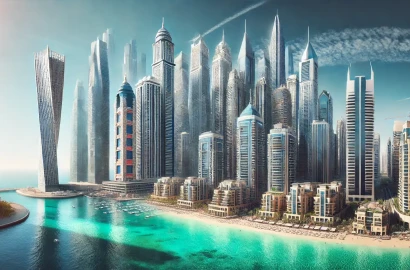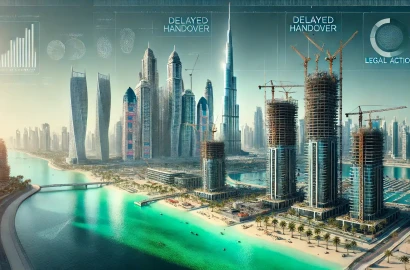Property is the most sought-after sector for local and foreign investors, pumping billions of dirhams every year to earn strong return on their investments. Over the years, Dubai has really streamlined its property buying process, spurring confidence especially among foreign investors looking to yield attractive returns.
The latest data proves the point as total volume of transactions in Dubai’s residential market hit 13-year high in May as the investors, high net worth individuals and entrepreneurs plan business migration to the city.
What are the documents required to buy property in Dubai?
If a buyer wants to purchase an off-plan or leasehold property, they need to provide a copy of their passport, that’s it. No special permit or documents are required. Properties fall under either the freehold or leasehold bracket. A leasehold property allows the buyer ownership of the property for 99 years or less as stipulated in the contract. In essence, the buyer only reserves the right to the property and not the land it is built on. A freehold property on the other hand gives complete ownership of both the unit and the land it is built on.
How much time does it take to complete the property purchase process?
Usually, a property transaction takes about four weeks, from the day the Agreement of Sale is signed. However, different variables can affect the timelines, such as the time of the year, the type of seller etc. For instance, a cash-to-cash transaction will always go faster than a mortgage-based transaction.
What is the minimum amount a buyer should have in hand when buying a property worth half a million dirhams in Dubai? Please share a breakdown such as DLD/RERA charges, processing fees etc.
It depends on whether the buyer wants to do a cash deal or takes the mortgage route. In either case, there are certain fees and costs that come into play starting from getting the NOC from the developer. This is not a fixed sum and differs from developer to developer. The value can vary anywhere from Dh1,000 to Dh5,000 excluding 5 per cent value-added tax (VAT). Then you have the standard 2 per cent commission charged by the agents. DLD charges a flat 4 per cent fee of the property value in addition to Dh430 for land or Dh40 for an off-plan property. Then we have the trustee fees, which is Dh4,000 plus 5 per cent VAT for ready properties and Dh5,000 plus VAT for off-plan properties.
What is the property purchase process in Dubai? Please share steps to buy property in Dubai.
Finding the right agent is vital. You need someone who not only understands your needs but is also abreast with all the legal nitty gritty, market conditions and has a proven track record. As far as the buying procedure goes, it’s pretty straightforward. Once both parties have agreed to the terms of the sale, they are required to sign an Agreement for Sale/MoU. At this point, a deposit of 10 per cent is required as proof commitment. The seller will then settle any outstanding fees to the developer, ranging from service charges to the permission to sell the property against a one-time fee. Once all dues are cleared, the developer issues an NOC to the seller and a new title deed is issued in the name of the buyer. This is where the property is officially transferred from the seller to the buyer. Keep in mind that on average, a property transaction in Dubai takes roughly 30 days from the day the Agreement for Sale is signed.
For off-plan purchases, an SPA (Sale & Purchase Agreement) is signed, which outlines the expected completion date of the property. Once the SPA is signed, an Oqood document is issued, which serves as a temporary registration till the time the buyer has the title deed in possession. The Oqood fee is typically 4 per cent of the purchase price. Once the property is ready, the Oqood becomes a title deed in the name of the new property owner.
What are the documents to be filled in when buying property in Dubai?
Once the buyer and seller have reached a verbal agreement, a seller signs a Form A contract between seller and broker, the buyer signs a form B contract between buyer and broker. A Form F is then generated that seals the deal. A sale agreement must be signed – also known as the MoU or Form F. Usually, your agent will get it ready for you. At this point, the buyer must also pay a 10 per cent security deposit, refundable when the property transfer is finalised.
For how long can a property developer delay the handover of the unit?
Assuming we're talking about project delays, not handover delays from completion: Real estate development is a complex process that requires a wide range of expertise as well as numerous, complex supply chains. As a result, even with the best intentions and planning, delays are possible. Developers are given a 12-month grace period from the expected completion date to the actual handover.
Can property buyer file a case against developer for excessive delay in handover?
Yes.
Are utility connection charges included when people someone buys a property?
In general, no. If the property is purchased off-plan, the connection of facilities takes place upon final payment and handover of the property. On the other hand, if property is purchased on the secondary market, the seller must clear all balances in order to receive an NOC from the developer before establishing a new connection.
What are the minimum and maximum service charges in Dubai?
The range is extremely wide depending on the location, asset type, quality specifications, facility inclusions, etc. For example, the service charge for apartments in prime areas in Dubai can range from Dh15 to Dh50 per sqft.
Can I buy property in instalments?
Yes, down payments and payment plans vary significantly between developers. Payment plans for off-plan properties can range from monthly instalments during construction to 5 years after completion. Extended post-completion payment plans may eliminate the need for mortgages; however, pre-completion payment plans (generally 40-60 per cent of the total sales price) can be aggressive. First-time buyer mortgages typically require 20-25 per cent of the purchase price in equity. The number and rate of instalments are determined by the buyer's residency, the length of the mortgage, and the property value.
What is the minimum value of the property that can get a Golden Visa to the property buyer?
The UAE Cabinet updated the long-term visa regulations in April 2022, stating that a Golden Visa (10 years) can be obtained when purchasing a property for Dh2 million. The property can be off-plan or completed, and it can be mortgaged through specific local banks.
How much fee is paid to Rera and DLD?
Completed properties
Fee type
Fee amount
Dubai Land Department fee
4% of property purchase price, plus an Dh580 admin fee
Property registration fee
For properties below Dh500,000: AED 2,000, plus 5% VAT
For properties above Dh500,000: Dh4,000, plus 5% VAT
Off-plan
To purchase an off-plan property, you will need to pay an Oqood (contract) fee, which is 4 per cent of the original property price.
What happens if I can’t pay off off-plan property instalments?
To begin with, the buyer should contact the developer and attempt to reach an amicable solution, such as an extension for future instalment’s, cancellation of the SPA with minimal penalty, and so on. If no solution is found, the developer has the option to terminate the contract.
What are the popular areas in the affordable, mid and high range for property buyers?
Affordable: Jumeirah Village Circle, JLT & Damac Lagoons
Mid-market: Dubai Marina, Business Bay & Arabian Ranches
High-end: Palm Jumeirah, Downtown Dubai & Emirates Living
Credit & Source: https://www.khaleejtimes.com/property/uae-all-you-need-to-know-before-and-after-buying-property-in-the-dubai ]
Related posts:
Discover PHOREE Real Estate, led by Munawar Abadullah with 30 years of American Wall Street expertise, and learn how our AI-driven insights empower smart investments in Dubai's hotel and real estate markets. PHOREE Real Estate, Munawar Abadullah, hotel investment, Dubai...
Discover the consequences for developers in Dubai who fail to meet handover dates and learn the legal actions buyers can take. This comprehensive guide covers penalties, compensation claims, regulatory intervention, and the steps to take before filing a legal complaint....

